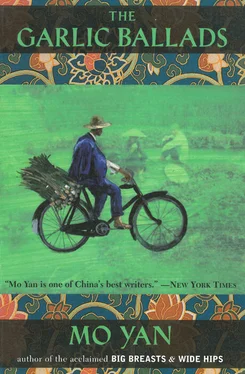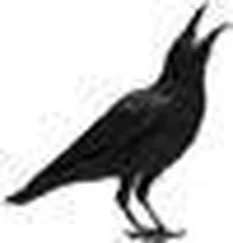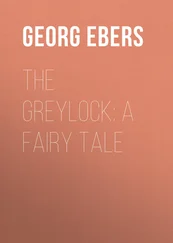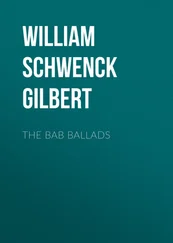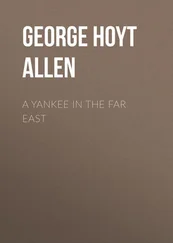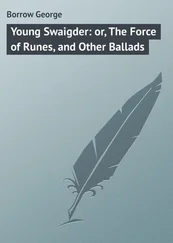Hoofbeats sounded in the lane. Summoning up what little energy he had left, Gao Ma gripped his saber tighdy and stood up, just in time to see his beloved chestnut colt poke its head over the broken wall. It seemed thinner; its eyes, larger now, and filled with compassion, were fixed on him. Tears gushed from his eyes: “Dearest … don’t leave me, please don’t leave me … I miss you … I need you….”
The horse slowly drew its head back into the surrounding darkness. He heard hoofbeats, heading south, away from him: loud and crisp at first, then softer and dull-edged, and finally, nothing.
2.
He handed a wad of bank notes to his neighbors Mr. and Mrs. Yu. “Elder Brother, Sister-in-Law, this is all I have. See what you can do. If it’s not enough, consider it a down payment. I’ll pay you back someday, I promise.”
He sat leaning against the wall beneath the window, saber in hand.
The Yus exchanged glances. “Should we inform her brothers?” she asked. “Your mother-in-law was arrested yesterday, along with Gao Yang.”
“Do what you can, folks, that’s all I ask.”
“Cremation or burial?” the man asked.
The idea of flames lapping the skin of Jinju and the infant in her belly nearly broke his heart. “Burial,” he said firmly.
The Yus hurried off, just as curious neighbors swooped down on the place. Some wept, others looked on dry-eyed and expressionless. The village boss, Gao Jinjiao, prowled the area, nosing around and sighing conspicuously. “Worthy Nephew,” he said as he approached Gao Ma, “You … urn …”
Gao Ma flashed his saber. “Village Boss, don’t push me!”
Gao Jinjiao scooted out of the way without even bothering to stand up straight.
Mrs. Yu returned with two yards of red satin, which she laid out in the yard after calling some women over. One of them, a seamstress, went inside to take Jinju’s measurements. Then she went to work with her scissors.
More curious villagers streamed into the yard, trampling the mangled parakeets, whose colorful feathers, swept up by breezes, stuck to their legs, clothing, and faces — but no one noticed.
Jinju’s body was laid out on the kang, in plain view of Gao Ma. The sun, direcdy overhead now, shone down through the red and yellow jute branches and talon-shaped leaves to light up her face and turn it into a golden chrysanthemum — a jinju —whose petals were coaxed open by autumn sunlight. He touched her face. It had the sleek resilience of costly velvet.
Then the Fang brothers showed up. First came Number Two, who marched sullenly across the yard, kicking parakeet feathers into the air; they floated down onto the red satin. As he strode through the door, a parakeet flew straight at him, as if wanting to peck out his eye. A swipe of his hand sent the bird crashing into the wall. He walked up to the kang and lifted a corner of the blanket, exposing Jinju’s face. She smiled up at him.
Disgusted, he let the blanket fall and walked into the yard. “Gao Ma,” he snarled, “you’ve ruined our family, you fucking bastard!” Rolling up his sleeves as he went, he headed straight for the wall, where Gao Ma was banging the dull side of the saber with the dangling manacle chain— clang chng chng . He glared at Fang Two through bloodshot eyes, stopping him in his tracks. Fang Two paused only to growl, “I’m charging you with the death of my sister!”
He had barely stormed off when Fang One came into the crowded yard, limping more noticeably than ever. His hair was streaked with gray, his eyes were clouded; he had become an old man almost overnight. He announced his arrival with loud wails that swirled through the yard — just like an old woman. Inside the house he pounded the kang and wept. “Sister — my poor baby sister — you shouldn’t have died like this!”
Fang One’s persistent wailing infected a gaggle of old women, who dabbed their teary eyes as they led the men into the room to carry him outside. “Elder Brother Fang,” they tried to console him, “there’s nothing you can do for her now except arrange for the funeral. That’s a brother’s responsibihty.”
It worked; he stopped wailing, wiped his runny nose, and said, “Marrying off a daughter is the same as dumping water on the ground. She stopped being a member of the Fang family long ago. Whether she’s buried in a crypt or tossed into a ditch is no concern of ours.”
He began to limp off, crying as he went.
Gao Ma stood up and halted him with a shout. “See if there’s anything left inside that you want to take with you.”
Fang One paused, but said nothing, then continued on out of the yard.
The women carried Jinju’s red satin funeral clothes inside, where they stripped her naked, washed her, and dressed her for her final trip. When they were finished, she wore bright red from head to toe, just like a new bride.
Gao Zhileng’s feet nearly flew as he charged into Gao Ma’s yard, where the corpses of his parakeets were strewn. He cursed and wept as he picked up the mangled bodies and laid them in a basket he’d brought along. “Gao Ma, Gao Ma, what did these birds ever do to you? Do what you want with people, but why kill my birds? They were my wealth. Now I’ve got nothing….”
Seven or eight surviving parakeets perched precariously on the tips of jute plants, rumpled feathers covered with blood. Their squawks were cries of desolation. Even Gao Ma felt sorry for them. Gao Zhileng puckered up and summoned them with a strange whistle.
“I’m from the provincial TV station. We heard about the tragic love affair between you and the giri Jinju. Would you mind telling our viewers exactly what happened?” The reporter, a man in his thirties who wore owl-shaped glasses, had a large mouth and terrible breath.
“I’m with the county league of women, in charge of investigating the three-family marriage contract, and would like your views on the subject.” She was young and heavily powdered. Her mouth had the smell of urine, and it was all Gao Ma could do to keep from lopping off her head with his saber.
“Get out of here, all of you!” he snarled as he got to his feet, saber in hand. “I have nothing to say to any of you!”
“Elder Brother Gao Ma, it’s too hot to worry about a coffin. Besides, the price of wood has soared since the Manchurian forest fire,” Yu Qiushui said as he took another look at Jinju’s swollen belly. “I bought a couple of rush mats and two yards of plastic. Wrapping her in plastic, then covering her with rush mats is as good as a coffin. That way we can get her peacefully into the ground without delay. What do you think?”
“Whatever you say, Elder Brother,” Gao Ma replied.
Meanwhile the TV reporter was all over the place, squatting and kneeling to get the best shots, including one of the parakeets perched on jute plants. It was a genre painting: yellow jute stalks, red jute stalks, green jute stalks … golden sunbeams on jute leaves … brighdy colored parakeets … a distraught Gao Zhileng, lips puckered in a whisde. The birds’ necks were drawn in as they made mournful cries that brought tears to their owner’s eyes.
“I sent six men to the graveyard east of the village to dig a hole. It’s time to start out,” Mr. Yu announced.
So the two new rush mats were laid out in the yard and covered with the sheet of pale blue plastic. Then four women carried out Jinju, in her new red satin clothes, and laid her on the plastic. Click! Pop! The reporter’s camera kept snapping pictures, while the powdered young woman ostentatiously filled a notebook with whatever she was writing. The yellow skin of her neck clashed with her white face powder, and again Gao Ma had to force back the urge to lop her head off where the two colors met.
Читать дальше
